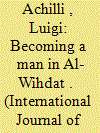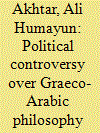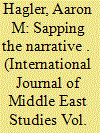|
|
|
Sort Order |
|
|
|
Items / Page
|
|
|
|
|
|
|
| Srl | Item |
| 1 |
ID:
139910


|
|
|
|
|
| Summary/Abstract |
This article explores the complex interplay between masculinity and nationalism among Palestinians living in a refugee camp in Jordan. Youth masculinity in the camp is widely perceived in Jordan as an expression of either immoral behavior or unthinking radicalism, and as a symbol of cultural and political difference and the failure of camp dwellers to embrace assimilation. However, camp dwellers’ masculinities are not uniform. I argue that young men's ability to navigate and master diverse and sometimes contrasting registers of manhood enables them to reproduce a Palestinian national identity in exile while achieving socioeconomic integration in Jordan. In pursuing this argument, the article has two goals: to challenge popular stereotypes about Palestinian refugees in Jordan today; and to problematize the discursive mutual dependency between nationalism and hegemonic masculinity in the study of Palestinian masculinity.
|
|
|
|
|
|
|
|
|
|
|
|
|
|
|
|
| 2 |
ID:
139907


|
|
|
|
|
| Summary/Abstract |
This article examines the extensive intellectual and social exchange that resulted from the Ottoman imperial incorporation of Arab lands in the 16th century. In the years immediately after the 1516–17 conquest of the Mamluk Sultanate that brought Egypt, Greater Syria, and the Hijaz under Ottoman rule, Turkish-speaking Ottomans from the central lands (Rumis) found that their political power was not matched by religious and cultural prestige. As the case of Damascus shows, scholarly gatherings called majālis (sing. majlis) were key spaces where this initial asymmetry was both acutely felt and gradually overcome. As arenas for discussion among scholars on the move, literary salons facilitated the circulation of books and ideas and the establishment of a shared intellectual tradition. As occasions where stories were told and history was made, they supported the formation of a common past. In informal gatherings and in the biographical dictionaries that described them, Rumis and Arabs came together to forge an empire-wide learned culture as binding as any political or administrative ingredient of the Ottoman imperial glue.
|
|
|
|
|
|
|
|
|
|
|
|
|
|
|
|
| 3 |
ID:
139908


|
|
|
|
|
| Summary/Abstract |
This article explores a covert partnership between a prominent Zionist agronomist, Menashe Meirovitch, and the Christian Arab editor of the newspaper Filastin, ʿIsa al-ʿIsa, a founding father of Palestinian nationalism. Under the literary guise of an Arab Muslim peasant called Abu Ibrahim, the two men produced a series of Arabic-language columns in 1911–12 that exhibited imperial citizenship par excellence, demanding political and agrarian reforms in Palestine in the name of strengthening the Ottoman Empire. The article explores their short-lived political alliance to interrogate historiographical uses of the press as a source for social history. Moreover, it challenges the portrayal of cooperation between Jews and Arabs as “collaboration” in its pejorative sense. Far from a simple story of betrayal or corruption, the partnership between the two men demonstrates how a shared commitment to Ottoman modernism brought them together more than nationalism, language, or religion pulled them apart.
|
|
|
|
|
|
|
|
|
|
|
|
|
|
|
|
| 4 |
ID:
139914


|
|
|
|
|
| Summary/Abstract |
During the reign of the Nasrid sultan Muhammad V in 14th-century Granada, the renowned literary figure Lisan al-Din ibn al-Khatib rose to the office of vizier and chief dignitary. A text on Graeco-Arabic philosophy and Sufism that he wrote under court patronage, Rawdat al-Taʿrif fi al-Hubb al-Sharif (The Garden of Knowledge of Noble Love), became the centerpiece of a famous court case against him that led to his downfall. Historians have had difficulty interpreting the case because of its political context. Was Ibn al-Khatib's demise really about his philosophical and mystical ideas given his entanglement in power rivalries at the court? Scholars have suggested that Ibn al-Khatib's text was used merely as a pretext to remove him from power. In contrast, I argue that the specific power rivalry between the chief qadi and Ibn al-Khatib only escalated into a court case because, at a time when Sufis were controversial, the qadi read Ibn al-Khatib's Sufi-inspired doctrines as a claim on his religious authority. Ibn al-Khatib's ideas, rather than a pretext for prosecution, were the necessary condition for the power rivalry to erupt into a court case. This reading of the case highlights the way intellectual debates shaped contingent political processes in the medieval Islamic world.
|
|
|
|
|
|
|
|
|
|
|
|
|
|
|
|
| 5 |
ID:
139912


|
|
|
|
|
| Summary/Abstract |
This article focuses on Islamist conscientious objectors (COs) in Turkey who have resisted both mandatory conscription and the Turkish state's use of Islamic discourses of jihad and martyrdom to legitimize it. Examining military conscript training and the post-1980 coup national school curriculum, the article first outlines the Turkish state's production of a particular interpretation of Islam and its dissemination of it through nationalist and militarist discourses and practices. The article then pursues an ethnographic analysis of Islamist COs’ resistance to conscription through nonviolent civil disobedience based on antiauthoritarian and antinationalist interpretations of Islam. Weaving together their own interpretations of jihad and martyrdom with transnational theories and ideologies, Islamist COs present a powerful critique of Turkish militarism and its religious claims. A focus on Islamist COs potently highlights the diversity of Islamic groups and sensibilities in contemporary Turkey, and the difficulties faced by nationalist projects to discipline religious imaginaries and put them to the service of the modern state.
|
|
|
|
|
|
|
|
|
|
|
|
|
|
|
|
| 6 |
ID:
139913


|
|
|
|
|
| Summary/Abstract |
One mission of Ibn Kathir's Kitab al-Bidaya wa-l-Nihaya fi al-Taʾrikh (The Book of the Beginning and the End in History) is to provide a Sunni answer to a generally ʿAlid-legitimizing corpus of early Islamic historical accounts. Part of the 13th- and 14th-century movement that sought to rehabilitate the image of Syria and the otherwise reviled Umayyad dynasty (r. 661–750), Ibn Kathir's grand work of history cleverly reframes the early Islamic narrative to fit into what he considers a more “properly” Sunni framework than his sources provided. This article focuses on Ibn Kathir's presentation of the shūrā, the council appointed by ʿUmar and charged with choosing from among its six members his successor. It identifies the literary tools Ibn Kathir employed and offers a framework for his strategy of employing them. Whether through narrative aside or criticism of other historians, Ibn Kathir's recasting of a pro-ʿAlid grudge story as an Umayyad apologetic highlights moments of sectarian contention and emphasizes the evolution of Sunni opinion on Ali and Uthman.
|
|
|
|
|
|
|
|
|
|
|
|
|
|
|
|
|
|
|
|
|